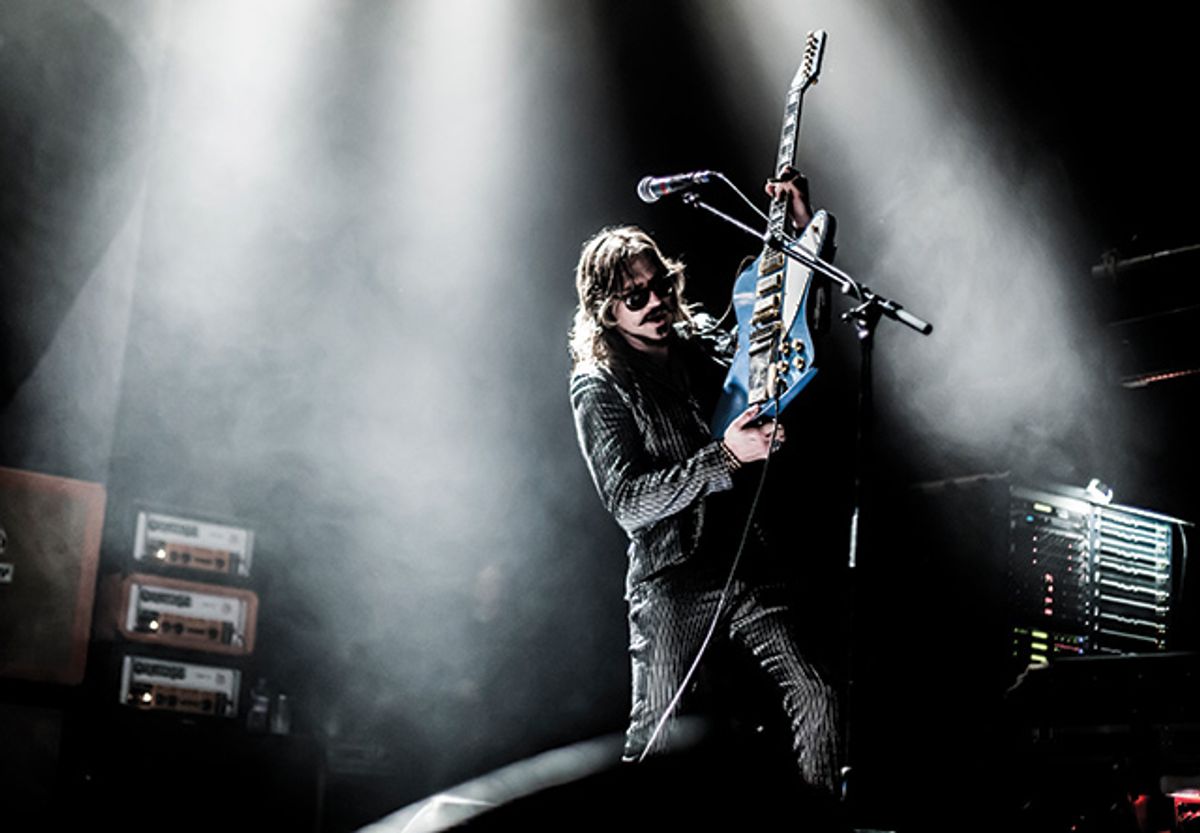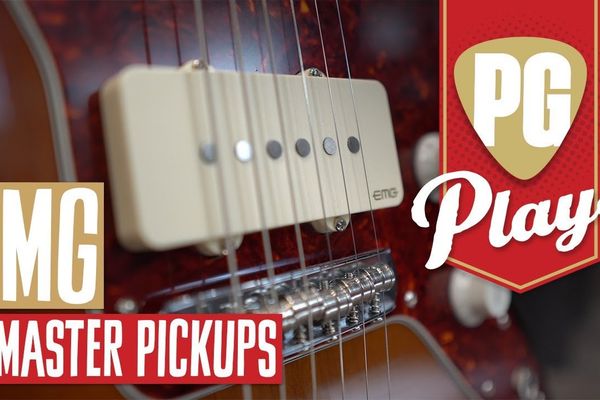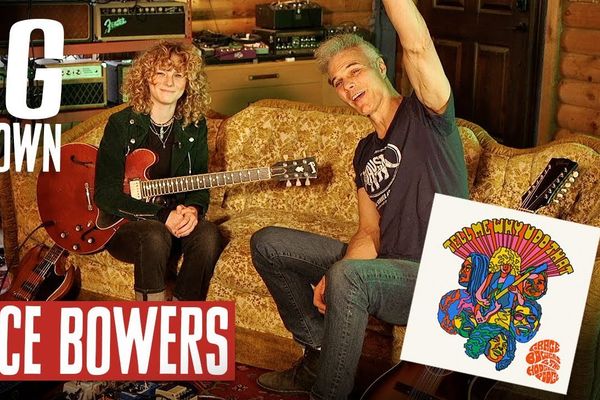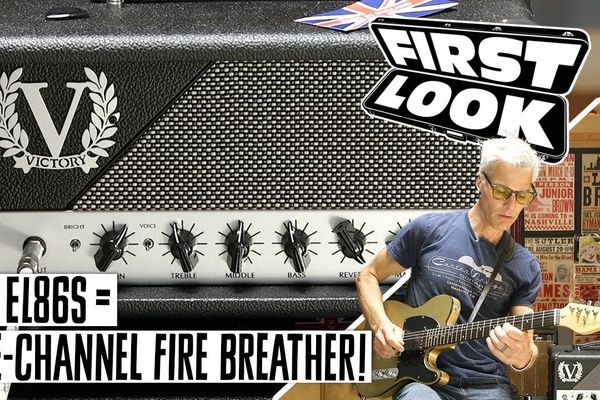After losing a deal with Atlantic Records and thinking all was lost, guitarist Scott Holiday stuck to his guns and went on to found Rival Sons—the buzzed-about strutters whose raw take on classic rock has found a fan in Jimmy Page, AC/DC, and Guns N’ Roses.
The phrase “When one door closes, another one opens” is often offered up to console someone whose dreams have just been shattered—someone who’s failed to capitalize on the chance of a lifetime. No one wants to be the one to point out the painful reality that when you lose, sometimes you just lose. But in the case of Rival Sons guitarist Scott Holiday, what could’ve been a tragedy did indeed turn into triumph.
Several years ago, Holiday was living every rocker’s dream—he and his band at the time, Human Lab, had signed a major-label deal. But the timing couldn’t have been worse. “When I was with Atlantic [Records], they were firing floors of people as we had signed this multimillion-dollar deal,” says Holiday. “My analogy about the major labels right now is that they’re like a burning building that everyone’s trying to jump out of. It’s collapsing on itself.” To make matters worse, Holiday’s creative freedom was being stifled, too: He had to report every step of the writing process to a suit for approval. When all was said and done, all the agony was for naught. “We knew the record wasn’t going to come out.”
After things unraveled, Holiday decided to start over in 2008. He’d met drummer Michael Miley and bassist Robin Everhart through mutual friends, and all they needed was a singer. While looking online, Holiday accidentally found Jay Buchanan through a link on the webpage of another singer he was checking out. “I’d been looking around all over the world and hadn’t found another guy like this in the same vicinity—not even in the same country … not even in the same universe,” Holiday recalls. “It was like I asked and the gods of rock had answered.” Upon meeting, the two bonded over their love of the blues and soul. “We talked about Son House, Howlin’ Wolf, and Blind Lemon, and Stax and Motown Records,” says Holiday. “I’m a big blue-eyed-soul fan, and my boy’s got it. He sounds like a young Paul Rodgers [of Bad Company and Free]—but he probably doesn’t know who Paul Rodgers is. He’s not really copying him, he just has that kind of tone.”
Since then, Rival Sons have been building a buzz across the rock world, opening for legends like AC/DC, Guns N’ Roses, and Judas Priest. None other than Jimmy Page has stated that Rival Sons is currently his favorite band, which sort of makes sense because there’s no denying the strong Zep influence in the quartet’s music. In fact, it’s a comparison that’s dogged them for most of their career. Strangely, though, the Sons signed with deathcore label Earache Records—whose other artists include the Dillinger Escape Plan, Deicide, Morbid Angel, and Napalm Death. It’s an unlikely pairing, for sure, but one that’s turned out to offer much more creative freedom than Atlantic Records did. “It's been a good thing so far,” says Holiday. “They don't intervene with our music—we don't turn in demos and we don't get approval from them. We are the approvers.”
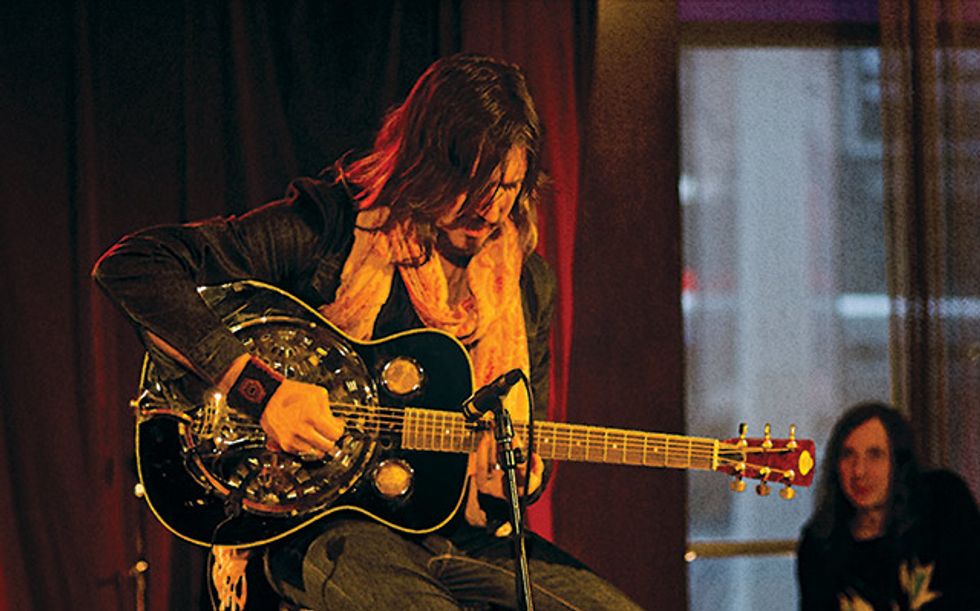
Rival Sons’ latest album, Head Down, is a raw, in-your-face collection of mostly first and second takes that was written and recorded over a 20-day marathon session at Honey Pye Studios in Nashville. “It’s not rocket science—it’s rock ’n’ roll, man,” Holiday laughs. “The writing process for all our records is the same, really—we just go to the studio and write in the moment. It’s a little different for me, because I’ve written entire albums—all the way down to the drum parts—before going to the studio. But we’re usually fitting our studio time in between tours. Because we’re always touring, we don't have the luxury of, say, taking a year to do an album.”
Head Down is more than just a bunch of bluesy riffs hastily thrown together, though. Sections like the interlude in “The Heist” feature layer upon layer of cinematic instrumentation that’s like a blend of surf and garage rock. “I call that my Ennio Morricone/Quentin Tarantino section,” says Holiday. “I just made it up on the spot and literally did that in one sitting. It took me about five minutes to do that whole thing. I don’t want to sound like some cocky asshole, but we’re musicians and we do that for a living. We’re having fun also—and when you’re having fun, shit goes down really easily.”
Holiday and company eschew plug-ins and studio trickery in order to keep things real, all the way down to things like the eighth-note pulses that permeate “Manifest Destiny, Pt. 1.” “It’s just tremolo, man,” he says of the totally locked-in feel, which he achieved with a Demeter Tremulator, though he uses a Strymon Flint for live gigs. “The band had to play to me—this band has never played to a click track. For so much of my favorite rock ’n’ roll, a click track is just a big no. Why would you do that? Music should breathe. ‘Manifest Destiny’ was recorded live—it was one take and was the first time we ever played that song. We just made the arrangement up on the spot. The middle solo was improvised and done in the first take. I just talked to the band about the middle eight. I told them I wanted something more like a musical conversation. Let’s listen, talk, and follow each other, and it will all come together and make sense.”
A throbbing tremolo sets up the trippy vibe in Rival Sons’ two-part “Manifest Destiny” suite. Scott Holiday’s epic solo begins at 3:06.
Although Head Down gets off to a raucous, in-your-face start, as the album progresses the band’s various musical personas come to the surface. By the 10th track, “Nava”—which is named after Holiday’s 4-year-old daughter—things take a more contemplative turn. Holiday explains the carefully orchestrated programming: “The record was designed for a double-vinyl presentation—the artwork, the writing, and everything—and the second record begins with ‘Nava,’ which is basically a foreshadowing of ‘True.’ We want to try to challenge our listeners and ourselves. ‘True’ was way outside for a rock band, and I think it’s an extraordinarily romantic song. It’s a different wave for a rock ’n’ roll singer to pull off. It’s beyond a Robert Plant- or a Jim Morrison-kind of thing. It could have been a turn-of-the-century folk song.”
Much like the band’s multi-generational sound, Holiday’s extensive gear collection is a mix of new and retro, spanning the gamut from a ’65 non-reverse Gibson Firebird to the recent addition of a Kauer Banshee. “Doug Kauer is a genius. I didn’t have that guitar in the studio unfortunately, but I got it soon after and I take that thing on tour and use it all over the place. I love it. My ’99 Gibson Firebird Custom is probably the guitar I use the most with this band, but I use all of them,” says Holiday. “I vary the set enough nightly that I’m using every guitar onstage—everybody’s in on the party!”
Holiday rocks “Goldie”—his new Kauer Banshee—during a grooving rendition of “Keep on Swinging,” the first single off Head Down, at the Rescue Rooms in Nottingham, England.
While some gear enthusiasts treat vintage gear with a holy reverence and keep things as stock as possible, Holiday experiments on all of his axes and will modify until he gets exactly what he wants. “I loved my ’62 Fender Jazzmaster but the original pickups were so small and tiny, and they weren’t playing ball with my other guitars,” he shares. “I talked to Jason Lollar and he sent me his P-90s. They were the greatest and most satisfying drop-in pickups I’ve ever had. Right when I put those in, they matched up with my other guitars really well. They’re really full, harmonic, and beautiful—and not overwound.”
Although Holiday is usually seen onstage with a wall of Orange OR50s, he used many amps, including vintage Fender Bassmans and Champs, for the Head Down sessions. Who knows if it was a conscious or subconscious nod to Jimmy Page, but the star of the bunch was producer Dave Cobb’s late-’30s Supro. “It looks like a piece of junk but it sounds killer,” says Holiday of the 1-knob box with a 6" speaker. “It gets so hot that, if you leave the thing plugged in, it will catch on fire. It ended up probably being my favorite amp of the session. I used it on most of the sweet-sounding, solo-y stuff. If you hit it with a Rangemaster or a good Tone Bender, it will just bloom in a certain way that sounds really great.”
Asked to recount the time when Page himself came to a Rival Sons show in Camden, London, Holiday admits, “I had to go off into my dressing room area and have a little tear, like a little 9-year old again. I knew he still collects and listens to vinyl, so I got all of our vinyls and put them aside for him. He was very, very affable. A very, very, nice guy. I’d just gotten a suit made, and we talked about John Varvatos and Ray Brown—who had made my suit—and we talked about different shoes. He’s obviously highly fashionable in the rock ’n’ roll world, so he was interested in my little doodads.”
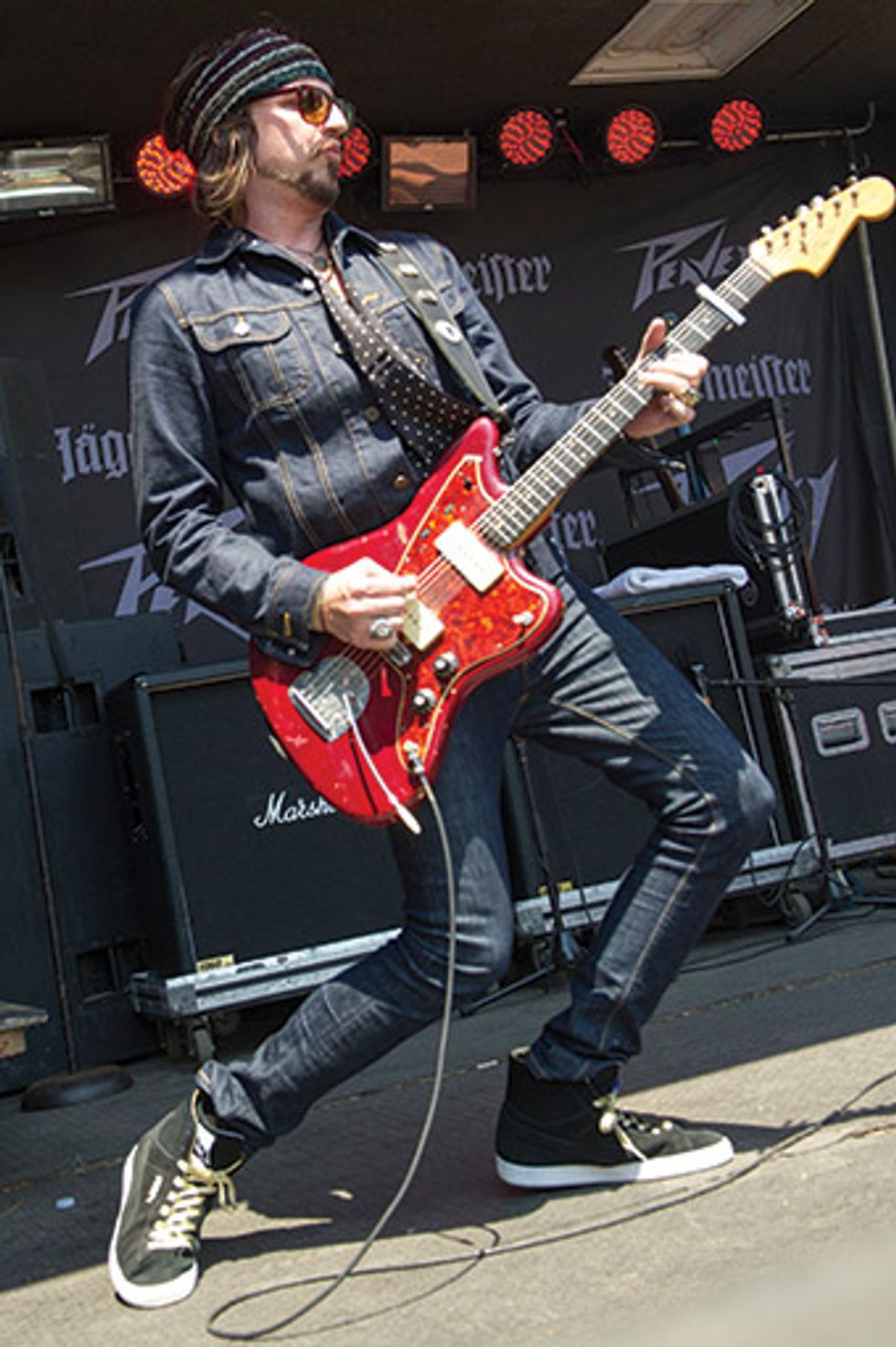
Guitars
Pelham blue 1999 Gibson Custom Historic Firebird VII with custom Tom Short pickups, sunburst 1965 Gibson non-reverse Firebird with custom Tom Short pickups, 1962 Fender Jazzmaster with Lollar P-90s, 2012 Kauer Banshee (“Goldie”) with custom Chris Klein pickups, 1960 Gibson ES-335 with Bigsby, 2000 Art Davis acoustic, 1930s–’40s National Dobro
Amps
Orange OR50s driving Orange 4x12 and 2x12 cabs (live), 1930s Supro with 6" speaker (studio), Silvertone 1485 (studio), ’60s Vox Berkeley (studio), ’60s Fender blackface Bassman (studio), ’50s tweed Fender Champ (studio)
Effects
Original Vox Tone Bender, Basic Audio Gnarly Fuzz, Z.Vex Fuzz Probe, Analog Man Peppermint Fuzz, Roger Mayer Octavia, Univox Super-Fuzz, Keeley Time Machine Boost, Analog Man King of Tone (version 4), Keeley-modded Line 6 DL4 Delay Modeler, Way Huge Aqua-Puss, KR Musical Megavibe, Way Huge Ring Worm, Electro-Harmonix Micro POG, Strymon Flint (live), Demeter Tremulator (studio), original Option 5 Destination Rotation, Custom Audio Electronics MC404 wah
Strings, Picks, and Accessories
Dunlop Stainless Steel electric strings (.010 sets), Cleartone acoustic strings (.010 sets), Dunlop Tortex .73 mm picks, George L’s pedalboard cables, Mogami Gold guitar cables, custom speaker cables, custom 1/4" cables from pedalboard to amps
Photo by Chris Schwegler/atlasicons.com
After Sons lead singer Jay Buchanan sings “Happy Birthday” to Tyler Bryant (of Tyler Bryant and the Shakedown), the band breaks into “All the Way” at Vinyl in the Hard Rock Hotel and Casino in Las Vegas. Check out the mean slide action that starts at the two-minute mark.
